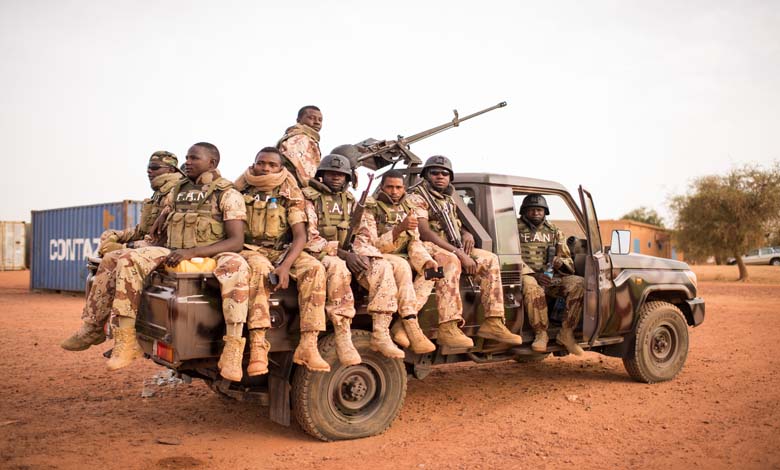Breach of Fortified Cities and Strategic Attacks: Terrorism Unsettles the African Sahel

The African Sahel is witnessing significant shifts due to the growing operations of terrorist organizations.
Political experts report that the large-scale assault by terrorist groups on the city of Djibo in northern Burkina Faso, followed by an attack on the border town of Diapaga, marks a dangerous turning point in the ongoing conflict between the state and extremist groups in the region. It highlights the tactical failure of the military containment strategy pursued by Burkina Faso and its regional partners to halt the spread of JNIM (Jama’at Nasr al-Islam wal Muslimin) and ISIS in the Greater Sahara.
-
Arming Dynamics of Extremist Groups in the African Sahel: What Is the Source of Their Arsenal?
-
Burkina Faso Strengthens Its Fight against Terrorism: New Brigades in “Vulnerable Areas”
Deep Penetration Attacks
In the early hours of May 11, hundreds of extremist fighters stormed Djibo — a stronghold of the Burkinabe army — using motorcycles and heavy vehicles in a lightning raid. They breached the city’s fortifications, killed soldiers and civilians, and advanced toward Diapaga near the borders with Niger and Benin.
Described by military sources as “the boldest attack in months,” this assault was far from conventional. It introduced a new strategic approach: bringing the battle into fortified urban centers, imposing full blockades, disrupting communication networks, and looting markets and supply depots.
-
Rising Terrorist Activities in the African Sahel… “Global Report”
-
With the “African Initiative,” Russia Strengthens Its Influence in Burkina Faso
Escalation or Fragmentation?
This development raises critical questions: Have the Burkinabe forces and their allies in the Sahel States Alliance (AES) lost their ability to contain the threat? Are we witnessing the beginning of a competitive escalation between Al-Qaeda (JNIM) and ISIS in the Sahara?
Strategic Collapse and Growing Threat
French political analyst Patrick Cournot, a specialist in African terrorist movements, said that the Djibo and Diapaga attacks provide “clear evidence of the collapse of the security belt strategy adopted by the Burkinabe government with support from Moscow, which failed to prevent the infiltration of fighters from Mali and Niger into central Burkina Faso.”
-
Mauritania Warns: The “African Sahel” Region among the World’s Most Severe Crisis Hotspots
-
Rise in Al-Qaeda activities in the African Sahel… What factors led to this?
He added, “We are entering a new phase of insurgency, characterized by flanking and surprise tactics, coordinated via interconnected regional operations rooms. This shows that armed groups now operate under a cohesive military strategy.”
Cournot urged Burkinabe authorities to adopt heightened vigilance and rethink their counter-terrorism strategies to avoid a repeat of the Djibo and Diapaga disasters.
Dr. Sadio Kandé, an African researcher on Sahel affairs at the University of Bamako, attributes the surge in violence to “a fierce power struggle between Al-Qaeda and ISIS in the region.”
-
Wagner Put to the Test After Bamako Attack: How Effective Is It in Fighting Terrorism?
-
Increasing Terrorism Activity in Africa: What Are the Implications and Solutions?
“Each group seeks to demonstrate its operational superiority, dragging civilians into a terrifying cycle of retribution,” he noted, adding that cities like Djibo and Diapaga have become battlegrounds for terrorist score-settling.
He stressed that military action alone is not sufficient: “Without a synchronized development plan and the reintegration of local volunteers into state structures, we’ll remain trapped in a never-ending cycle of chaos.”
-
Terrorism and Gold… Burkina Faso Traces Its Troubles Back to French Legacy
-
Warnings of Escalating Terrorism in Mali After European Troops Withdraw
From Defense to Smart Offensive
In response to the current escalation, Dr. Kandé advocates for a new strategy in the Sahel built on:
joint regional military maneuvers instead of static defensive postures;
strengthening community intelligence;
infiltrating the logistical networks of armed groups;
and restructuring the Volunteers for the Defense of the Homeland (VDP) into a proactive, preemptive force.
He also called for urgent development projects in border areas to win over local populations against terrorist groups.












